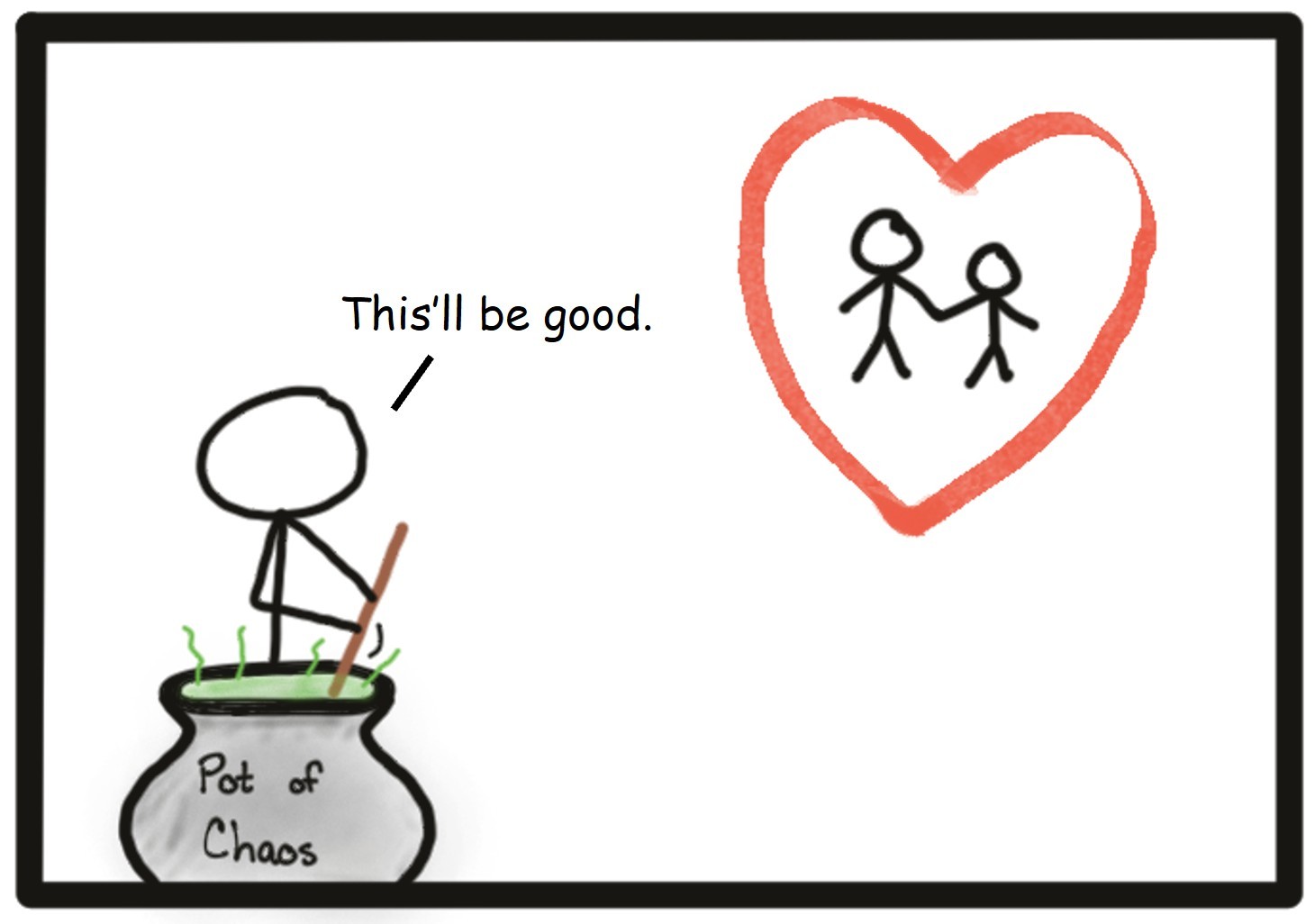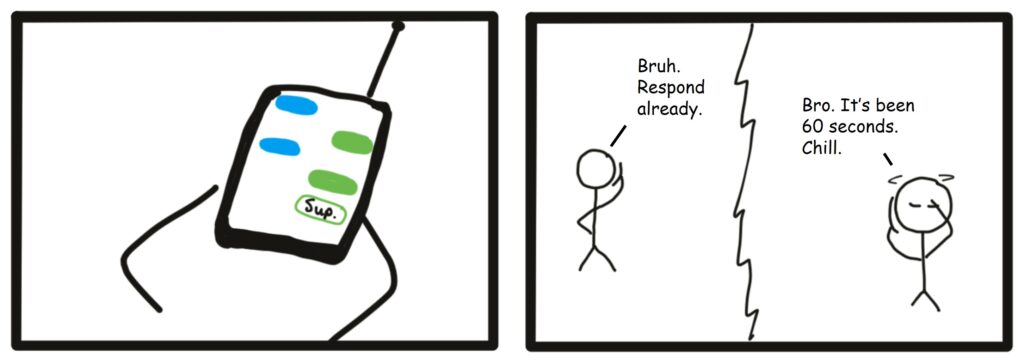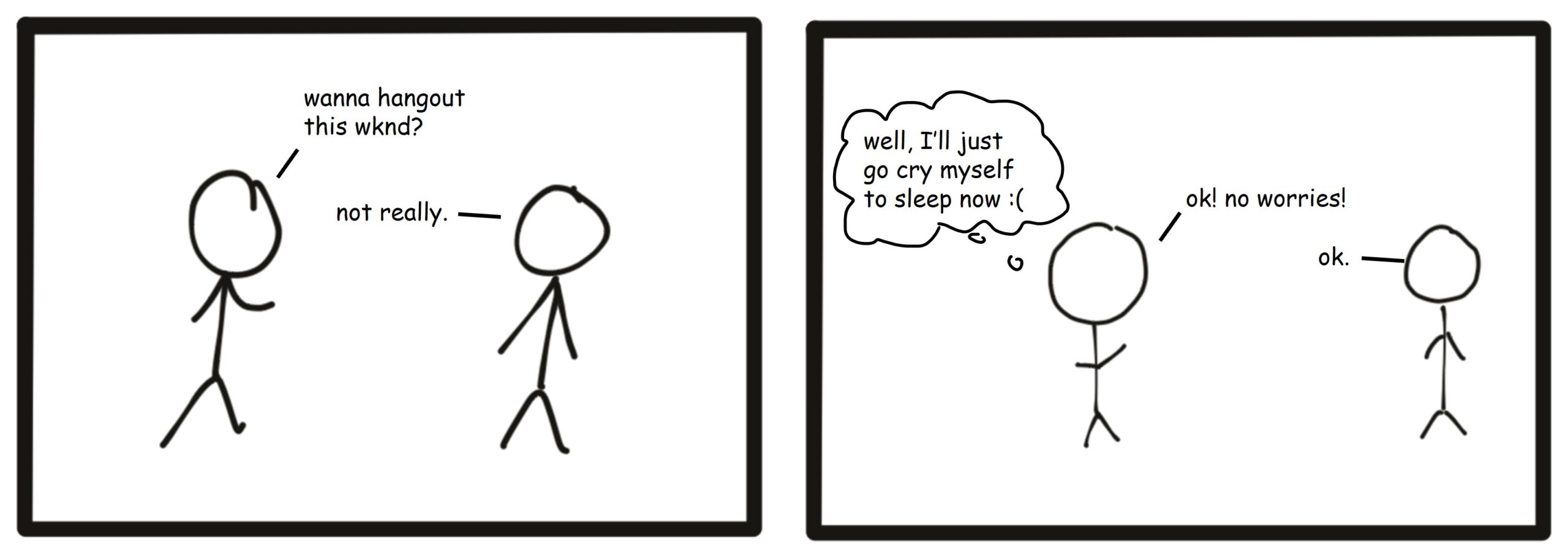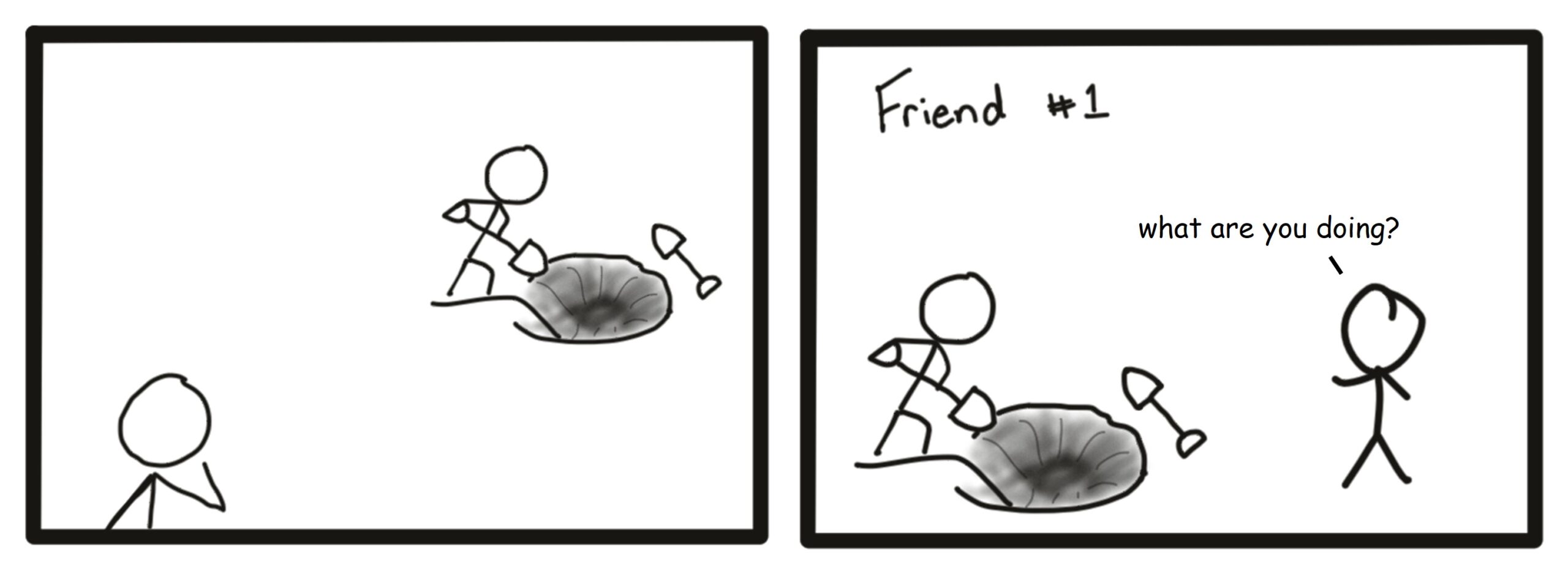You should have expectations, and the closer the friend, the more expectations you should have of them.
Expectations by any other word are still expectations. Desires, wants, needs, standards = expectations. Or, at the very least, hopes. Hopes just come less attached.
Let me put it this way: would you like it if your friends and family had no expectations of you? You could do whatever you want whenever you want and they’d just say:

No of course not. Maybe in our teenage years but we’re past that.
The people you know expect you to be reasonably predictable—consistent if you will. Consistent with your values if nothing else.
True unpredictability in a relationship is a recipe for chaos.

So What About the ‘No Expectations’ Gurus?
Why all the hubbub saying you shouldn’t have any expectations of others? Because people wrap their sense of self-worth up in those expectations and it’s a recipe for disaster.

If you can’t untether your ego from your expectations, you’re really expressing needs, not wants. Untethered expectations are equal to wants.
To tell the difference between the two think of it like this: you know it’s a need when “no” wasn’t actually one of the options for your emotional wellbeing.

Whenever you notice a visceral reaction to their ‘no’, that is a trigger to do some soul searching. Why did that hurt so much? What am I lacking or wanting more of? Sometimes those emotions externalize as anger. Watch out for that too.
Whenever you experience a negative emotion, get curious. Go root it out and figure out where it’s coming from. Open the black box you’ve been keeping in your head if you have to.


Let me circle the wagons back.
Having expectations of other people is not bad. Generally, try to have little to no expectations of people that you don’t care about so they’re more likely to exceed your expectations.
When it comes to people you care about, you should have standards that you hold them to. Those standards come from the ones they’ve set (verbally expressed or demonstrated across experiences) or the ones that you’ve set for them via a boundary. Boundaries are behaviors that you’ve asked them to not repeat. Standards can also metamorphosis into goals of growth for each other.
So What is a Friend?
A friend is someone who actively tries to make you better. A friend with no expectations of you is extremely unlikely to make you a better person. They might accidentally or haphazardly teach you something along the way but they didn’t go out of their way to make sure you didn’t miss the lesson.
You had to catch the lesson on your own.
So, yes, you can learn something from everyone, but some people also won’t leave learning that lesson up to chance.
Sometimes friends with good intentions fear upsetting you more than they care about your personal growth. This is noble in a way but can also be a “ruinous empathy” as Kim Scott put it. A ruinous empathy is being more concerned about someone’s emotions than saying the thing that would help them grow. It is being nice over kind.
If you find yourself saying, I need to wait until the timing is right, and the timing still hasn’t been right after many moons, this is probably you. That’s okay. Your heart is in the right place but you need to know when to cause necessary pain and discomfort to those you care about.
Timing is important but waiting for perfect will leave you forever waiting.
It is difficult to have expectations of others and hold them to a higher standard. It is risky in fact. It might cost you the relationship. Do it anyway. You’ll find yourself with a much more fulfilling relationship on the other side.
One Caveat.
Your high expectations of your friends need to come with high support: 1) your high expectations need to come across as a belief that they can do it 2) you need to be actively looking for ways to help them get there.
To illustrate that point, let me show you three different kinds of friends…



Which friend are you most of the time?
Friend #1 is a fan. Curious about what you’re doing but nothing more.
Friend #2 is a much better friend, perhaps even a close friend.
Friend #3 is a best friend. No questions asked. I see what you’re doing and how to I can help. Let’s get to work.
Thought Experiments:
What are your standards (ie., expectations) of your friends?
What are your closest friends’ expectations of you?
What would be your expectations of a best friend?
2 responses to “To have Expectations or to Not? That ’tis the question.”
I have though about your post for a while and was having a hard time coalescing my thoughts in a coherent manner to post this response. After recently listening to a podcast (quoted and linked below) that was germane to this topic, I was finally able to figure out how to add to the discussion–especially after getting some AI feedback to flesh out my thoughts. 🙂
The premise of your case to have expectations is in effect an a priori fallacy wherein a set of synonyms are summarily discarded (“Expectations by any other word are still expectations”) without any real acknowledgement that these are separate words with separate meanings. Obviously, there is overlap and some similarity with one another or else by definition they would not be considered synonyms. However, each carries its own nuance and emotional weight that gets to the core of the question of whether “expectations” is the best term to use and hold on to (which I do not believe is true for personal relationships).
Here is a quick ChatGPT response to the differences between expectations, goals, desires, and hopes:
[BEGIN Block Quote]
Expectations – What you believe will or should happen.
Key quality: Often based on external factors, norms, or past experiences.
Example: I expect my boss to give me feedback after the project.
Nuance: Can feel like an obligation or assumption—failure to meet expectations can lead to disappointment.
Goals – What you actively set out to achieve.
Key quality: Specific, actionable, and often measurable.
Example: My goal is to run a marathon next year.
Nuance: Implies effort, planning, and intention—it’s something you work toward.
Desires – What you deeply want, often emotionally driven.
Key quality: Personal longing, sometimes irrational or unattainable.
Example: I desire more adventure in my life.
Nuance: More abstract and internal than goals; can be fleeting or persistent.
Hopes – What you wish for but don’t control.
Key quality: Optimistic, uncertain, and often dependent on external factors.
Example: I hope the weather is nice for our picnic.
Nuance: Lighter than desire, less structured than goals, and less assured than expectations.
Summary:
Expectations → Assumed outcomes. (“I think this will [should] happen.”)
Goals → Concrete objectives. (“I will make this happen.”)
Desires → Emotional wants. (“I wish this would happen.”)
Hopes → Optimistic wishes. (“I want this to happen, but I can’t control it.”)
[END Block Quote]
As was have wrestled with the concept of the appropriateness of expectations and your post, I happened upon an episode in a podcast that also helped to provide some words to help me describe my discomfort with your points about having expectations in relationships. This podcast from Andy Stanley was specifically using the term “goals” but in the spectrum from my ChatGPT search, I think it fits both levels of “expectations” and “goals” (at least in regard to others):
[BEGIN Block Quote]
“Never ever set a goal for another adult, never set a goal, you can set goals for you, but you don’t set goals for other adults, even adult family members, because a goal is an agenda. I have a goal for you, I want you to do something or say something or accomplish something, so I have an agenda. So every time I’m with you, you know what I’m bringing to the relationship? I’m bringing my agenda for you, and agendas always, always, always undermine or put a box around relationships. This is why your relationship with your boss, is friendly as everybody wants to get, there is an agenda, he or she hired you to do a job and you are friendly and they are friendly, but you’re probably not gonna be life-long friends, you’re gonna get along, you’re gonna be polite, but if there’s an agenda, what between you are in the room, with you and another person, it really is like having a third party in the room and agendas ensure… They ensure that broken relationships stay broken and this may explain why some of your efforts in the past to restore or repair a relationship have failed.
“I’ll just make it personal, do you enjoy people who have an agenda for you? No, because soon as they sit down, your guard is up, you know where this is going. Again, it’s like a third party, it’s like a third person sitting at the table. Parents, this may explain… Your kids push back, your adult kids push back, it may explain why they check their watch when they’re visiting with you. Do you enjoy people who you feel like are always evaluating and judging you?” https://www.youtube.com/watch?v=PVnzsutYe6w&t=957s (16:00 — 17:38)
[END Block Quote]
This idea of imposing an agenda on others is directly aligned with what ChatGPT responded about expectations: “Can feel like an obligation or assumption.” It is for these reasons that I do not believe that we should have expectations of others in personal relationships (professional/business relationships do have agendas with implicit and explicit expectations including even written contracts).
This is not to say that we should not be building into our relationships/friendships. However, rather than imposing expectations, there are two Biblical phrases that apply: “spur one another on” and “iron sharpens iron”. Presenting these phrases to ChatGPT resulted in the following:
[BEGIN Block Quote]
“Spur One Another On” vs. “Iron Sharpens Iron”
Both phrases describe encouragement, growth, and accountability, but they carry different nuances in how that growth happens.
1. “Spur One Another On” (Hebrews 10:24)
Meaning: To motivate, push, or urge others toward action, especially in a positive direction.
Tone: Encouraging, energetic, sometimes urgent.
Imagery: A spur on a rider’s boot that nudges a horse forward—not to harm, but to prompt movement.
Focus: Inspiration and action—helping others move forward in faith, goals, or personal development.
Example Usage:
“Let’s spur each other on to do good in the world, even when it’s difficult.”
“A coach spurs their team on by setting high expectations and pushing them to improve.”
2. “Iron Sharpens Iron” (Proverbs 27:17)
Meaning: People grow and improve through challenge, friction, and accountability from others.
Tone: Strength-building, sharpening, sometimes tough but necessary.
Imagery: Two blades striking against each other—the friction sharpens both.
Focus: Mutual refinement—growth happens through deep conversations, friendly challenges, and accountability.
Example Usage:
“In strong friendships, iron sharpens iron—we help each other grow through honest conversations.”
“Debate and discussion are good! Iron sharpens iron, and we all get sharper through constructive disagreement.”
Key Differences:
Phrase: Focus; Action; Imagery
Spur One Another On: Motivation & pushing forward; Encouraging movement; Rider’s spur moving a horse
Iron Sharpens Iron: Growth through challenge; Mutual refinement; Two blades sharpening each other
In Combination:
These two phrases work together—we spur one another on to take action, and in the process, iron sharpens iron as we refine each other through accountability and challenge.
[END Block Quote]
When you discuss what is means to be a friend, you state “A friend is someone who actively tries to make you better. A friend with no expectations of you is extremely unlikely to make you a better person.” Whereas I agree with the first part, I disagree with the use of “expectations” in the second part–it is not healthy to set obligations, have assumptions or agendas for others. Instead, a good friend will work to provide accountability through deep conversations and challenges: i.e., “iron sharpening iron”. This is also not done in a vacuum but are built on the depth of the relationship and do not come from you–and hence are not expectations that you are imposing on them. You did actually state this in passing: “When it comes to people you care about, you should have standards that you hold them to. Those standards come from the ones they’ve set.”
In the end, we cannot change another person but can only change ourselves. Therefore, having expectations of others imposes obligations and an agenda on them that just provides us with an excuse to consider their behavior (or even worse, they themselves) as a failure. Instead, we should be doing what we can to motivate, encourage, and spur them on to improve themselves. Note that this can be challenging and not always pleasant in the moment (who really wants to be nudged by a spur?), but if we truly cherish the other person, then it is worth it to invest the effort to sharpen them–and deal with any friction that will also sharpen us.
Thank you for the long thought out response! A couple of return thoughts! Having standards for a friend is having an expectation, however, there is not an attached obligation. I expect my close friends to behave fairly consistently with their espoused values and if they don’t, I’ll need to reevaluate that friendship. The friend is not obligated to follow my expectations whatsoever but we both have them of each other which become part of the standard for what we consider a close friend would do.
I disagree with the “we cannot change another person but can only change ourselves”. We certainly can do things that change other people and that is a principle goal of leadership! I’m sure there’s more to that thought though, so what do you mean when you use that phrase?
A key difference I think between what we are saying is for me an expectation is not an obligation nor an agenda. Instead it is me stating what I think you are capable of or something I hope you would do or be. No forcing function on my part, no obligations to fall in line. The choice remains theirs.
I think what I see in your responses is a waiting for permission to hold their friend accountable whereas I lean towards making the attempt to better them whether or not they’ve asked for it, which I’m sure makes it sound like a forced ordeal. The betterment is expressed but not obligated or forced. The attempt is what matters! Most people want to stay as they are in their status quo and nudging them out of that mediocre state often isn’t something they’ve asked for to begin with but something folks usually appreciate after the fact.
Thoughts?